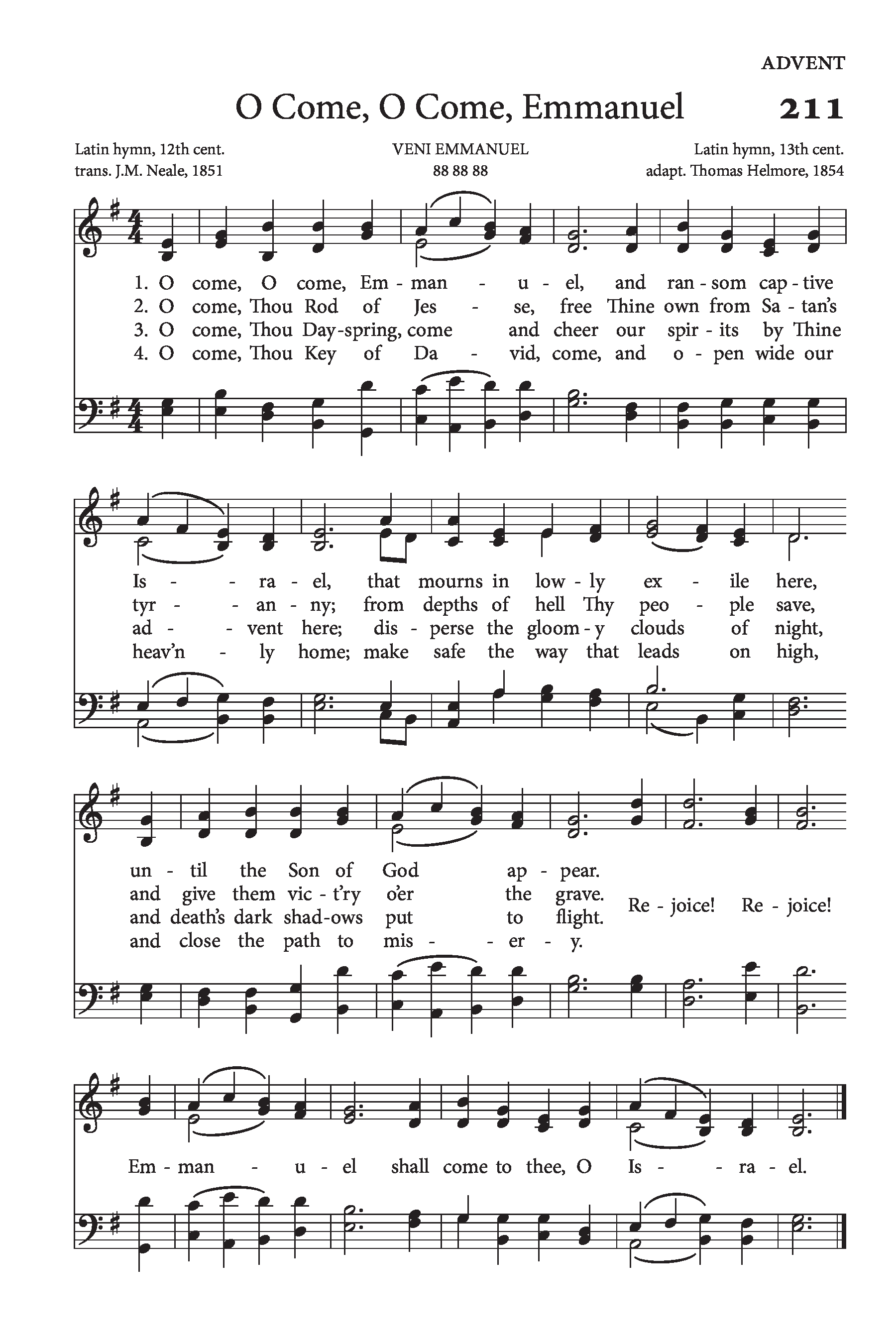O Come, O Come, Emmanuel
By J. M. Neale
Lyrics
and ransom captive Israel
that mourns in lonely exile here
until the Son of God appear.
Rejoice! Rejoice! Immanuel
shall come to you, O Israel.
who ordered all things mightily;
to us the path of knowledge show
and teach us in its ways to go.
who to your tribes on Sinai's height
in ancient times did give the law
in cloud and majesty and awe.
unto your own and rescue them!
From depths of hell your people save,
and give them victory o'er the grave.
and open wide our heavenly home.
Make safe for us the heavenward road
and bar the way to death's abode.
and bring us comfort from afar!
Dispel the shadows of the night
and turn our darkness into light.
in one the hearts of all mankind.
Bid all our sad divisions cease
and be yourself our King of Peace.
Bible Reference
Isaiah 7:14, Zechariah 9:9, Matthew 1:23
About This Hymn
Author: Latin origin, circa 12th century
English Translation: John Mason Neale (1818–1866)
Music: Plainsong/Chant, circa 13th century
Tune Name: Veni Emmanuel (“Come, God With Us”)
Meter: Long Meter (88.88) with Refrain
Scripture References: Isaiah 7:14; Zechariah 9:9; Matthew 1:23; Luke 1:32
“The Lord God shall give unto Him the throne of His father David.” — Luke 1:32 (KJV)
Hymns are among the richest treasures of Christian worship, conveying profound spiritual truths across cultures, centuries, and denominational boundaries. One such example is “O Come, O Come, Emmanuel”, a hymn that originated in the medieval Roman Church during the 12th century and possibly even earlier. It was first sung as a series of Antiphons—short liturgical refrains used at Vespers (evening prayer) during the Advent season. Each antiphon begins with “O” and addresses Christ using a different messianic title from Scripture: Emmanuel, Lord of Might, Rod of Jesse, Day-Spring, and Key of David. These titles reflect the Old Testament hopes for the coming Redeemer. The melody associated with the hymn is a hauntingly beautiful plainsong chant, a form of early sacred music that predated modern musical notation and was widely used in monastic settings.
During the 19th century, there was a renewed interest in ancient Christian hymnody among Anglican scholars and clergy. One of the most influential figures in this movement was John Mason Neale, born in London on January 24, 1818. A gifted translator and clergyman, Neale dedicated his life to recovering and bringing into English many of the Greek, Latin, and German hymns of the early and medieval Church. His translation of “O Come, O Come, Emmanuel,” published in the mid-1800s, is now one of the most beloved Advent hymns in the English-speaking world. Neale also translated other treasured hymns, such as “The Day of Resurrection,” “All Glory, Laud and Honor,” and “Art Thou Weary?”
Advent—the four-week period leading up to Christmas—is a time of spiritual preparation, reflection, and anticipation of Christ’s first coming. The promises of the Messiah date back to the sixth century B.C. during Israel’s Babylonian exile. For centuries, the Jewish people awaited their Deliverer with longing and expectation. The hymn reflects this historical yearning in the plea to “ransom captive Israel.” Yet, despite the fulfillment of these prophecies in the person of Jesus Christ, many did not recognize Him. As John wrote, “He came unto His own, and His own received Him not” (John 1:11). Still, believers throughout history have joined the faithful of old in lifting their voices in this deeply moving Advent prayer.
Modern hymnals typically include five of the original antiphonal verses, each addressed to Christ using a different prophetic title:
-
Verse One – “Emmanuel”: Meaning “God with us,” this title affirms Christ as the divine Deliverer who comes to dwell among His people. The imagery of Israel in captivity alludes to humanity's separation from God—longing for redemption and restoration.
-
Verse Two – “Lord of Might”: A reference to the giving of the Law on Mount Sinai, where God revealed His power amid thunder and lightning (Exodus 19:16). This name emphasizes Christ’s divine authority as the eternal Lawgiver.
-
Verse Three – “Rod of Jesse”: Drawn from Isaiah 11:1, this verse prophesies the Messiah’s descent from Jesse—the father of King David. Jesus fulfilled this by being born from the Davidic lineage, thus uniting royal heritage with divine purpose.
-
Verse Four – “Day-Spring”: This poetic title refers to the rising of the sun and symbolizes the coming of divine light into a dark world. The priest Zechariah echoed this in Luke 1:78–79: “The dayspring from on high hath visited us… to give light to them that sit in darkness.”
-
Verse Five – “Key of David”: Based on Isaiah 22:22, this verse signifies Christ’s sovereign authority over God's kingdom. Isaiah 9:6 confirms this royal power: “The government shall be upon His shoulder.”
“O Come, O Come, Emmanuel” powerfully unites longing and fulfillment, past hope and present faith. The hymn affirms that the long-awaited Messiah did come, two thousand years ago, and completed the work of redemption for a fallen world. Yet it also expresses the continued yearning of the Church for Christ’s Second Coming—the moment when He will return in glory and complete the final victory over sin and death. Until that day, we echo the voices of believers across the centuries with the same cry: “Rejoice! Rejoice! Emmanuel shall come to thee, O Israel.”


📬 Subscribe to Our Devotional Updates
Receive weekly hymns, devotionals, and website features directly in your inbox.
Hymn Information

- Category: Hymn
- Author/Writer: J. M. Neale (1851)
- Added: July 3, 2025
- Last Updated: January 19, 2026
- Views: 6946
To view the author's biography, click their name above.
MIDI File
Popular Hymns
Recent Blog Posts
Popular Blog Posts
Visit Us on Social Media
Latest from X (Twitter)
Tweets by HymnalLibraryLatest from Facebook
Latest on YouTube
Daily Bible Verse
Disclaimer
The hymns, sheet music, MIDI files, and related content on this website are provided for educational and research purposes only.
- Public Domain: Many of the hymns featured here are in the public domain and may be freely used.
- Copyrighted Works: Some hymns may still be under copyright protection. Where applicable, permission has either been requested from the copyright owner, or the content is shared under the principles of fair use for educational purposes.
⚠️ Important Notice: If you wish to reproduce, distribute, or use any copyrighted hymn beyond personal study or educational use, you must obtain permission directly from the copyright holder. This website does not grant any rights for commercial use yet.
If there is any other question please address it to us in our Contact Page, for further assistance. Thank you for using the site. May God Bless You.













